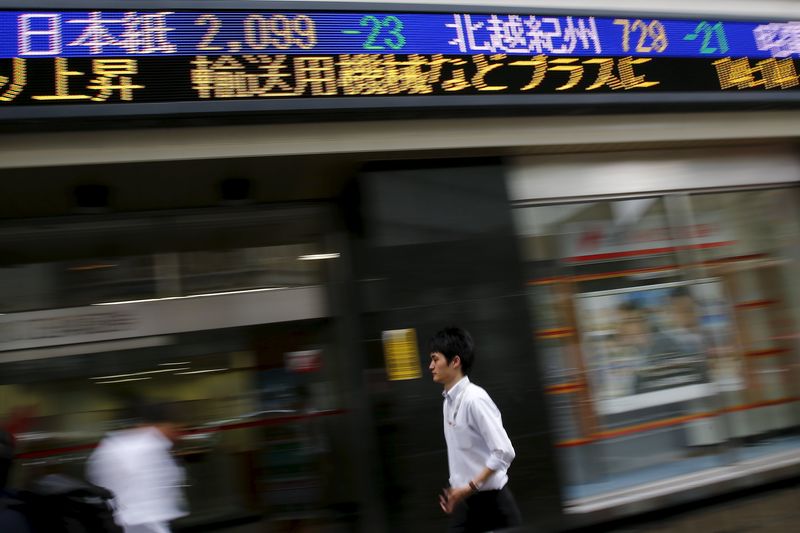By Hideyuki Sano
TOKYO (Reuters) - Asian shares fell to a two-year low on Tuesday on worries that cooling demand in China will weigh on the trade-reliant region, while the dollar held firm after strong U.S. housing data offset concerns from a weak manufacturing report.
But spreadbetters expected better sentiment in Europe, with Germany's DAX <.GDAX>, Britain's FTSE (FTSE) and France's CAC 40 (FCHI) all seen up 0.3 percent.
The MSCI's broadest index of Asia-Pacific shares outside Japan (MIAPJ0000PUS) fell 0.4 percent, hitting its lowest level since August 2013, while Japan's Nikkei (N225) dipped 0.2 percent.
"Investors are becoming cautious ahead of a likely U.S. rate hike, which they haven't seen for a long time. Concerns that the slowdown in China will hurt other Asian countries with close link to China are weighing as well," Masahiro Ichikawa, senior strategist at Sumitomo Mitsui Asset Management.
Thai shares (SET) hit a 1-1/2-year low and the baht fell to six-year low after a bomb blast in Bangkok on Monday killed 19 people, including three foreign tourists.
Wall Street shares rose on Monday though two highly contrasting U.S. economic indicators left many market players scratching their heads on the state of the U.S. economy and added to uncertainty over when the Federal Reserve will begin raising interest rates.
The New York Fed's Empire State general business conditions index tumbled from 3.86 in July to -14.92 in August, its lowest since April 2009, due to steep drops in new orders and shipments.
But a later report from the National Association of Home Builders showed U.S. homebuilder sentiment rose in August to its highest level since a matching reading almost a decade ago.
Wall Street shares rose in the end, with the S&P 500 Index (SPX) gaining 0.5 percent. But U.S. bond prices also gained, with the benchmark 10-year yield slipping to 2.162 percent (US10YT=RR).
U.S. interest rate futures <0#FF:> <0#ED:> hardly budged, with markets still not fully convinced the Fed will raise rates in September.
Most investors, however, are certain a rate hike will occur by the end of year but any subsequent rate hikes will come very slowly, given the fragile state of the global economy.
That outlook is enough to set the dollar apart from other currencies which are likely to be capped by continued or further monetary easing.
The dollar index against a basket of currencies (DXY) held firm after three days of gains to stand at 96.953. It has risen over 1 percent from a one-month low of 95.926 hit last Wednesday following China's surprise devaluation of the yuan.
"It's not that China is trying to intentionally lower the yuan long-term. It has just brought down the yuan in line with realistic levels as the yuan had been kept in a way artificially high," said Shuji Shirota, head of macro economic strategy group at HSBC in Tokyo.
"The impact of the yuan move on global markets isn't large," he said.
China's central bank on Tuesday set the yuan's midpoint
The euro eased 0.2 percent to $1.1058
Commodity prices remained under pressure from worries about slower growth in China. Indonesia reported a much deeper than expected drop in its July exports, with sales to China down 10.7 percent from a year earlier.
Brent oil futures

Copper futures